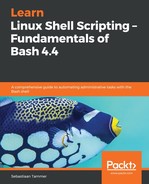In Chapter 9, Error Checking and Handling, we created the following construction: command || { echo "Something went wrong."; exit 1; }. As you (hopefully) remember, the || syntax means that everything on the right-hand side will only be executed if the command on the left-hand side has an exit status that is not 0. While this setup worked fine, it did not exactly increase readability. It would be much better if we could abstract our error handling to a function, and call that function instead! Let's do just that:
reader@ubuntu:~/scripts/chapter_13$ vim error-functions.sh
reader@ubuntu:~/scripts/chapter_13$ cat error-functions.sh
#!/bin/bash
#####################################
# Author: Sebastiaan Tammer
# Version: v1.0.0
# Date: 2018-11-11
# Description: Functions to handle errors.
# Usage: ./error-functions.sh
#####################################
# Define a function that handles minor errors.
handle_minor_error() {
echo "A minor error has occured, please check the output."
}
# Define a function that handles fatal errors.
handle_fatal_error() {
echo "A critical error has occured, stopping script."
exit 1
}
# Minor failures.
ls -l /tmp/ || handle_minor_error
ls -l /root/ || handle_minor_error
# Fatal failures.
cat /etc/shadow || handle_fatal_error
cat /etc/passwd || handle_fatal_error
This script defines two functions: handle_minor_error and handle_fatal_error. For a minor error, we will print a message but the script execution does not stop. A fatal error, however, is considered so severe that the flow of the script is expected to be disrupted; in this case, it is of no use to continue the script so we'll make sure the function stops it. By using the functions combined with the || construct, we do not need to check for exit codes inside the functions; we only end up inside the functions if the exit code was not 0, so we already know we're in an error situation. Before we execute this script, take a moment to reflect how much we improved the readability with these functions. When you're done with that, run this script with debug output, so you can follow the entire flow:
reader@ubuntu:~/scripts/chapter_13$ bash -x error-functions.sh
+ ls -l /tmp/
total 8
drwx------ 3 root root 4096 Nov 11 11:07 systemd-private-869037dc...
drwx------ 3 root root 4096 Nov 11 11:07 systemd-private-869037dc...
+ ls -l /root/
ls: cannot open directory '/root/': Permission denied
+ handle_minor_error
+ echo 'A minor error has occured, please check the output.'
A minor error has occured, please check the output.
+ cat /etc/shadow
cat: /etc/shadow: Permission denied
+ handle_fatal_error
+ echo 'A critical error has occured, stopping script.'
A critical error has occured, stopping script.
+ exit 1
As you see, the first command, ls -l /tmp/, succeeds and we see its output; we do not enter the handle_minor_error function. The next command, which we do expect to fail, does indeed. We see that we now go into the function and the error message we specified there is printed. But, since it is only a minor error, we continue the script. However, when we get to cat /etc/shadow, which we consider a vital component, we encounter a Permission denied message that causes the script to execute handle_fatal_error. Because this function has an exit 1, the script is terminated and the fourth command is never executed. This should illustrate another point: an exit, even from inside a function, is global and terminates the script (not just the function). If you wish to see this script succeed, run it with sudo bash error-functions.sh. You will see that neither of the error functions is executed.
